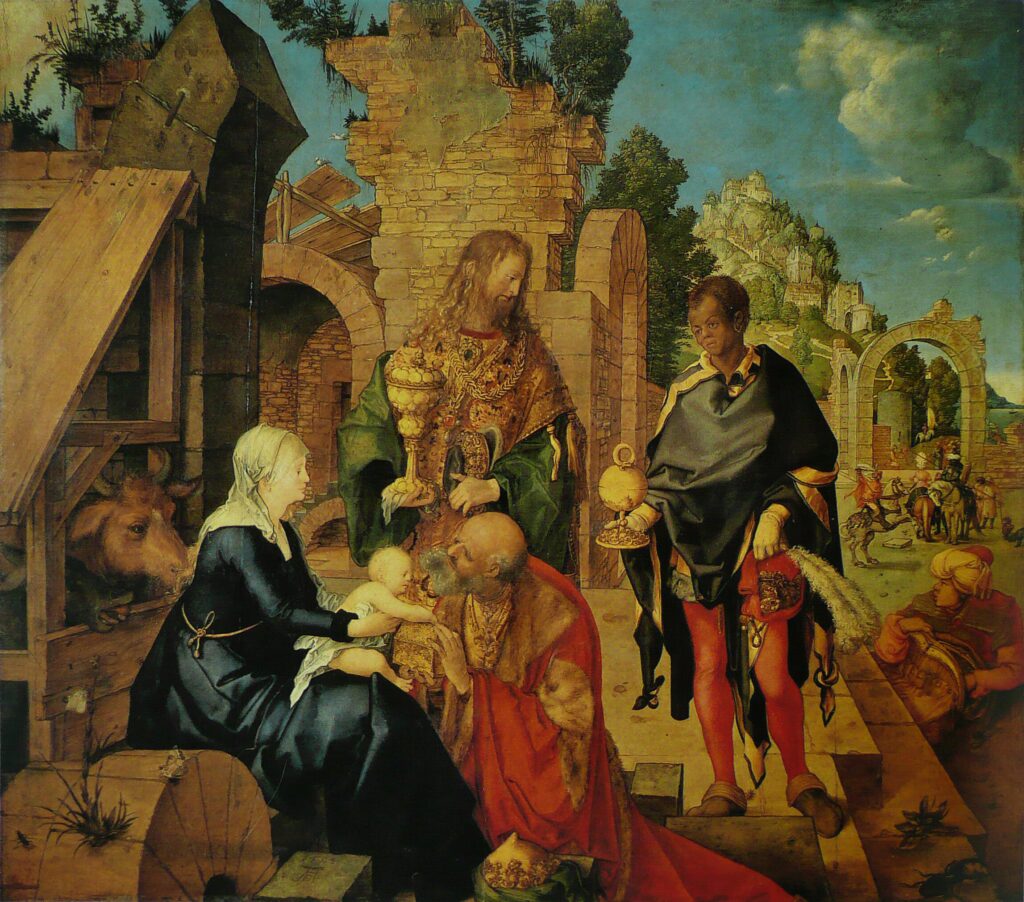Note: If you wish to receive, via e-mail, (1) my weekly newsletter or (2) daily copies of these posts, write to me at rrbates1951@gmail.com. Comments may also be sent to this address. I promise not to share your e-mail with anyone. To unsubscribe, write here as well.
Sunday
Integral to the Epiphany story is the long and difficult journey involved. T.S. Eliot emphasizes this in the most famous poem about the magi’s journey, having the speaker observe,
A cold coming we had of it,
Just the worst time of the year
For a journey, and such a long journey:
The ways deep and the weather sharp,
The very dead of winter.
That’s the way it is with vision quests: to penetrate the veil that separates the numinous from the everyday requires discipline and dedicated effort. But as forbidding as this may sound, there are ways to keep from being overwhelmed. In “For Those Who Have Far to Travel,” poet Jan Richardson notes that “one of the mercies of the road” is that
we see it only by stages
as it opens before us,
as it comes into our keeping
step by single step.
Richardson alerts us to the various guides to which we have access:
to be faithful to the next step;
to rely on more than the map;
to heed the signposts of intuition and dream;
to follow the star that only you will recognize;
to keep an open eye for the wonders that
attend the path;
to press on beyond distractions
beyond fatigue
beyond what would tempt you from the way.
And at the end, the poet tells us, what you offer up is the gift “that only you can give.” What is this gift? Christina Rossetti tells us in her “Christmas Carol”:
What can I give Him,
Poor as I am? —
If I were a Shepherd
I would bring a lamb;
If I were a Wise Man
I would do my part, —
Yet what I can I give Him, —
Give my heart.
Sometimes it takes a journey to discover this heart.
For Those Who Have Far to Travel
By Jan Richardson
If you could see the journey whole
you might never undertake it;
might never dare the first step
that propels you
from the place you have known
toward the place you know not.
Call it one of the mercies of the road:
that we see it only by stages
as it opens before us,
as it comes into our keeping
step by single step.
There is nothing for it but to go
and by our going take the vows
the pilgrim takes:
to be faithful to the next step;
to rely on more than the map;
to heed the signposts of intuition and dream;
to follow the star that only you will recognize;
to keep an open eye for the wonders that
attend the path;
to press on beyond distractions
beyond fatigue
beyond what would tempt you from the way.
There are vows that only you will know;
the secret promises for your particular path
and the new ones you will need to make
when the road is revealed by turns
you could not have foreseen.
Keep them, break them, make them again:
each promise becomes part of the path;
each choice creates the road
that will take you to the place
where at last you will kneel to offer the gift
most needed— the gift that only you can give—
before turning to go home by another way.
Previous Posts about Epiphany Poems
—Dudley Delffs: Seeking Our Heart’s Desire
—Bruce Monroe Robison: “A Baby’s Cry, A Big Bang”
—Scott Bates: The Epiphany from a Camel’s Point of View
—Scott Bates: Epiphany Sunday and the Arabian Nights
—Scott Bates: The Real Story of Christmas
—T.S. Eliot: A Cold Coming We Had of It
—Mary Oliver: The Wonder of First Snow
—Madeleine L’Engle: The Stable Is Our Heart
—Joseph Brodsky: Three Beams Closing In and In on the Star
—George Mackay Brown: A Light on the Darkling Road
—Rainer Maria Rilke, Denise Levertov, Leonard Cohen: What I Heard Was My Whole Self
— John Thorkild Ellison: A Pause in Time and the Soul’s Awareness
—Scott Bates: Christmas at the Courthouse
—John Milton: What Is Dark in Me Illumine
—Scott Bates: A Season for Miraculous Breakthroughs
—Muriel Spark: Where Do We Go from Here?
—Scott Bates: A Hitchhiker’s Guide to the Nativity:
—Malcolm Guite: The Dove Descends, The Spirit Soars
—William Butler Yeats: An Uncontrollable Mystery on the Bestial Floor


